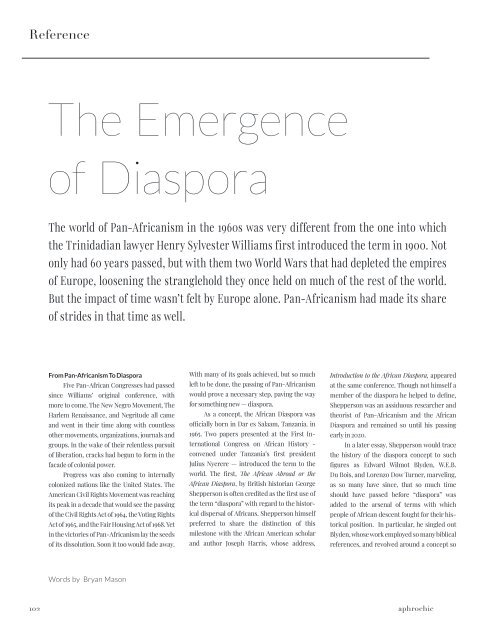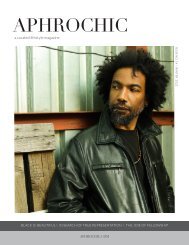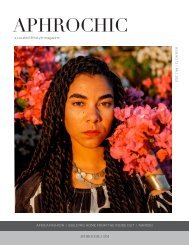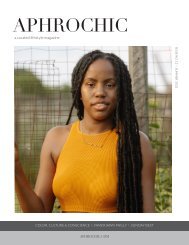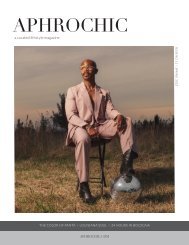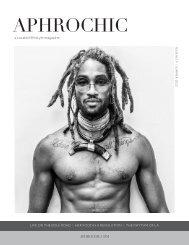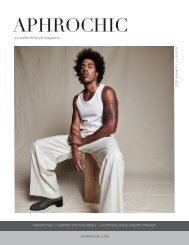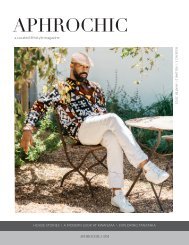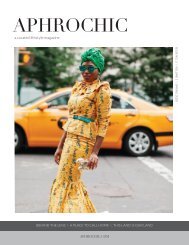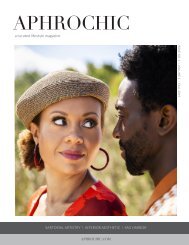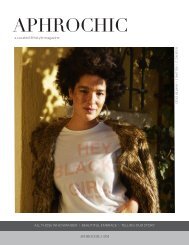AphroChic Magazine: Issue No. 4
In this issue, we sit down with artist, Malik Roberts, who relates the experience of creating one of the few African American artworks to sit permanently in the Vatican collection. Fashion designer, Prajjé Oscar John-Baptiste introduces his latest collection — an ode to Haiti, and its goddesses. We head to South Carolina to experience the Gullah-inspired music of Ranky Tanky. And in New York, we watch a new world being born with photographer and journalist, Naeem Douglass, who takes us inside the city’s Black Lives Matter protests, and economist Janelle Jones, who reminds us in these times that we are the economy. We are thrilled to share our cover with chef and musician, Lazarus Lynch. Inside, we talk with him about his cookbook, Son of a Southern Chef and his new album, I’m Gay. From a house tour in Brooklyn to a travel piece in Tobago, this issue takes you all over the Diaspora. And we see how of the concept of Diaspora was first introduced in a look back at how Pan-Africanism led the way to how we think of international Blackness today. It is a showcase of our culture, our creativity, our resilience, and our diversity, our demands for the present and our hopes for the future. Welcome to our summer issue.
In this issue, we sit down with artist, Malik Roberts, who relates the experience of creating one of the few African American artworks to sit permanently in the Vatican collection. Fashion designer, Prajjé Oscar John-Baptiste introduces his latest collection — an ode to Haiti, and its goddesses. We head to South Carolina to experience the Gullah-inspired music of Ranky Tanky. And in New York, we watch a new world being born with photographer and journalist, Naeem Douglass, who takes us inside the city’s Black Lives Matter protests, and economist Janelle Jones, who reminds us in these times that we are the economy.
We are thrilled to share our cover with chef and musician, Lazarus Lynch. Inside, we talk with him about his cookbook, Son of a Southern Chef and his new album, I’m Gay.
From a house tour in Brooklyn to a travel piece in Tobago, this issue takes you all over the Diaspora. And we see how of the concept of Diaspora was first introduced in a look back at how Pan-Africanism led the way to how we think of international Blackness today. It is a showcase of our culture, our creativity, our resilience, and our diversity, our demands for the present and our hopes for the future. Welcome to our summer issue.
You also want an ePaper? Increase the reach of your titles
YUMPU automatically turns print PDFs into web optimized ePapers that Google loves.
Reference<br />
The Emergence<br />
of Diaspora<br />
The world of Pan-Africanism in the 1960s was very different from the one into which<br />
the Trinidadian lawyer Henry Sylvester Williams first introduced the term in 1900. <strong>No</strong>t<br />
only had 60 years passed, but with them two World Wars that had depleted the empires<br />
of Europe, loosening the stranglehold they once held on much of the rest of the world.<br />
But the impact of time wasn’t felt by Europe alone. Pan-Africanism had made its share<br />
of strides in that time as well.<br />
From Pan-Africanism To Diaspora<br />
Five Pan-African Congresses had passed<br />
since Williams’ original conference, with<br />
more to come. The New Negro Movement, The<br />
Harlem Renaissance, and Negritude all came<br />
and went in their time along with countless<br />
other movements, organizations, journals and<br />
groups. In the wake of their relentless pursuit<br />
of liberation, cracks had begun to form in the<br />
facade of colonial power.<br />
Progress was also coming to internally<br />
colonized nations like the United States. The<br />
American Civil Rights Movement was reaching<br />
its peak in a decade that would see the passing<br />
of the Civil Rights Act of 1964, the Voting Rights<br />
Act of 1965, and the Fair Housing Act of 1968. Yet<br />
in the victories of Pan-Africanism lay the seeds<br />
of its dissolution. Soon it too would fade away.<br />
With many of its goals achieved, but so much<br />
left to be done, the passing of Pan-Africanism<br />
would prove a necessary step, paving the way<br />
for something new — diaspora.<br />
As a concept, the African Diaspora was<br />
officially born in Dar es Salaam, Tanzania. in<br />
1965. Two papers presented at the First International<br />
Congress on African History -<br />
convened under Tanzania’s first president<br />
Julius Nyerere — introduced the term to the<br />
world. The first, The African Abroad or the<br />
African Diaspora, by British historian George<br />
Shepperson is often credited as the first use of<br />
the term “diaspora” with regard to the historical<br />
dispersal of Africans. Shepperson himself<br />
preferred to share the distinction of this<br />
milestone with the African American scholar<br />
and author Joseph Harris, whose address,<br />
Introduction to the African Diaspora, appeared<br />
at the same conference. Though not himself a<br />
member of the diaspora he helped to define,<br />
Shepperson was an assiduous researcher and<br />
theorist of Pan-Africanism and the African<br />
Diaspora and remained so until his passing<br />
early in 2020.<br />
In a later essay, Shepperson would trace<br />
the history of the diaspora concept to such<br />
figures as Edward Wilmot Blyden, W.E.B.<br />
Du Bois, and Lorenzo Dow Turner, marveling,<br />
as so many have since, that so much time<br />
should have passed before “diaspora” was<br />
added to the arsenal of terms with which<br />
people of African descent fought for their historical<br />
position. In particular, he singled out<br />
Blyden, whose work employed so many biblical<br />
references, and revolved around a concept so<br />
Dr. Edward Wilmot Blyden.<br />
Sir Harry Johnston,<br />
Liberia, (London: Hutchinson<br />
& Co., 1906). General<br />
Research and Reference<br />
Division, Schomburg<br />
Center for Research in<br />
Black Culture, The New<br />
York Public Library.<br />
The Second Pan-African Congress. Special Collections & University Archives,<br />
W.E.B. Du Bois Library, University of Massachusetts, Amherst.<br />
W.E.B. Du Bois.<br />
Photographs and Prints<br />
Division, Schomburg Centers<br />
for Research in Black Culture,<br />
The New York Public Library.<br />
Words by Bryan Mason<br />
102 aphrochic issue four 103


